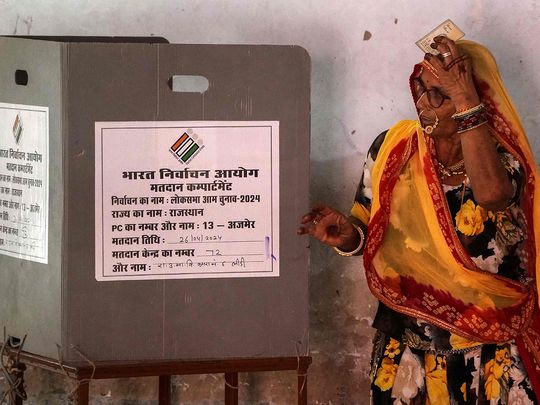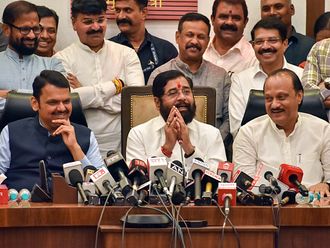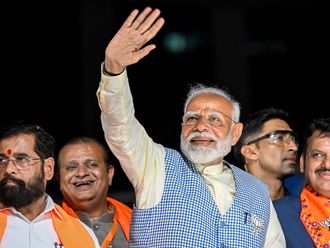
In Nashik a few weeks ago, I asked an adivasi woman who she thought was going to win the Maharashtra assembly elections.
“I don’t know,” she replied, “I know I am going to vote for whoever has given me the Ladki Bahin money.”
And who has given you that money?
“I don’t know but I’ll find out and make sure I vote for them.”
“Is it not unfair that the government is giving money to women but not to men?” I asked jokingly.
“So far, it’s always been men who have been given money. They go and blow it away on alcohol. It’s for the first time that women have been given money and we are spending it on children.”
That moment, I knew that the ruling three-party Mahayuti alliance was going to win the election.
Women voters are usually the most silent ones. They don’t easily open up. In the tea shops, it is men who dominate with both their presence and their voices. Even the women who completely refuse to talk elections could not hide their happiness over the cash transfers they had received recently from the government. Many would smile, some even blushed.
Yes, there were those who said, what about inflation? But this rebuttal came more from men, especially of Maratha or other castes, people who were ideologically opposed to the Mahayuti or at least its largest constituent, the Bharatiya Janata Party.
I met many men who said they were voting for the opposition Mahha Vikas Aghadi but their wives were probably going to vote for the Mahayuti.
The Mukhi Mantri Majhi Ladki Bahin Yojana gives ₹1500 a month to women between 21 and 65 years of age, provided that their annual family income is less than ₹2.5 lakhs. Let’s say a family that earns ₹20,000 a month (which would be very few families in rural Maharashtra) gets an additional ₹1500 a month. That amounts to a 7.5% increase in income, and that too by doing nothing.
To consider how much ₹1500 a month is for the average Maharashtrian, please note that ₹2.5 lakh is not even the average per capita income in many of the state’s poor districts.
Why should anyone be surprised, then, that the Mahayuti has swept the election? The real surprise is that the Maha Vikas Aghadi won 50 seats at all!
While women were enthused by the scheme because it gave them a sense of empowerment, ultimately it affects men too, since it raises the entire family’s income. The Mahayuti government went a step further and made sure 2.5 crore women got 5 instalments in the space of three months. The July and August instalments were transferred together in mid-August.
After the third instalment in September, the government gave the November instalment in advance along with the October instalment in view of the elections. In this manner, the government transferred Rs7,500 in the accounts of 2.5 crore women in the space of two months. Nearly 20,000 crore rupees are estimated to have been given to the people in this way in just two months.
The first response of the Maha Vikas Aghadi leaders after the election results were out was that they failed to counter the Ladki Bahin Yojana. They are right. How do you compete with a scheme whose name translates to “My Beloved Sister Scheme”?
The silver bullet
The 15 percentage point difference between the Mahayuti and the Maha Vikas Aghadi looks less striking when you consider that the Mahayuti’s 49% vote share is only 5.5 percentage point more than the BJP-led National Democratic Alliance’s 43.5% vote share in the Lok Sabha elections in June. The MVA lost its Lok Sabha votes not only to the Mahayuti but also to other, smaller parties.
This points to a poor campaign by the MVA no doubt. The MVA campaign was too little too late, too negative and too focused on countering Ladki Bahin Yojana rather than setting its own agenda.
The MVA campaign should have kept up the momentum from the day the Lok Sabha results were out, when the Congress surprisingly won more seats than the BJP. To be sure, they would have lost anyway, because Rs7,500 is a lot of money for the poor.
There were other factors too. Onion farmers were less angry because the onion export ban was lifted. The Maratha agitation fizzled out. The BJP learnt from its Lok Sabha fall and reworked its micro-caste outreach. The RSS worked extra hard. Eknath Shinde was — surprisingly — liked by the people.
The BJP’s victory in Haryana energised the Mahayuti. But all these factors put together would not have delivered a victory, such was the anti-incumbency sentiment against the Mahayuti. Without the Ladki Bahin Yojana, we would have had an MVA victory.
Tried and tested
In Jharkhand, Hemant Soren of the Jharkhand Mukti Morcha has pulled off a remarkable feat in being a rare non-BJP party that returns to power with more seats and more vote-share than the last time. Guess what? He too had a cash transfer scheme for women. Rs1,000 a month, of which three instalments were given before elections.
If both Jharkhand and Maharashtra saw ruling parties use this magic bullet, it was because in December 2023 Shivraj Singh Chouhan used a similar scheme to win a thumping majority when many expected him to lose.
In Haryana recently the BJP did not have the time to implement such a scheme but they did promise it and implementation is now in the works. West Bengal, Karnataka, Odisha and Assam already have such schemes.
Cash transfers to women are the new free electricity — every state, every election is going to see them. Politicians will struggle to find the money in the state finances, and thus also to find newer ways of impressing the woman voter. She is now front and centre of Indian politics.












